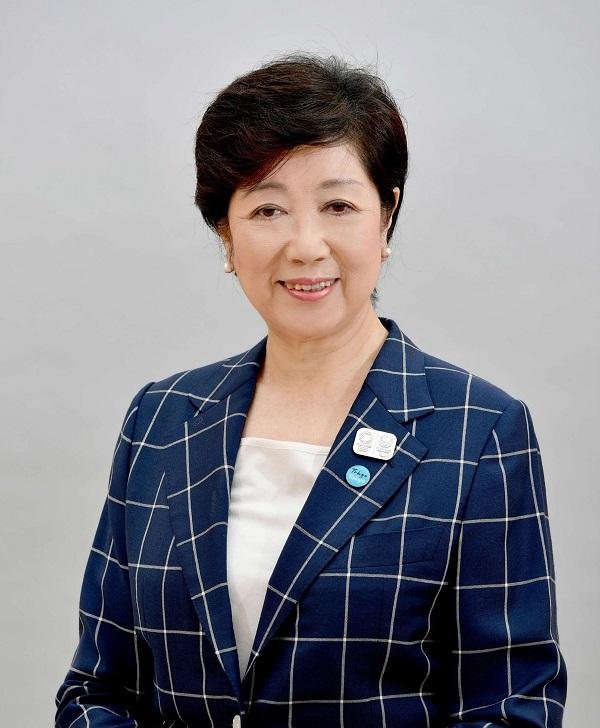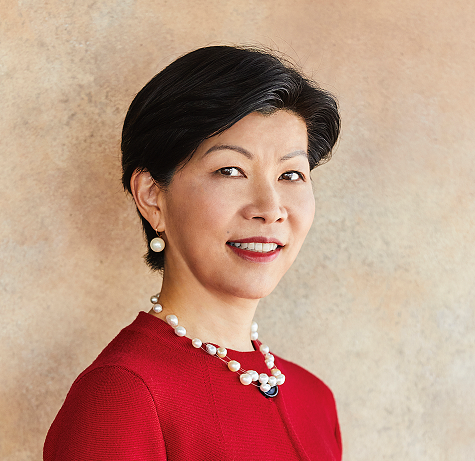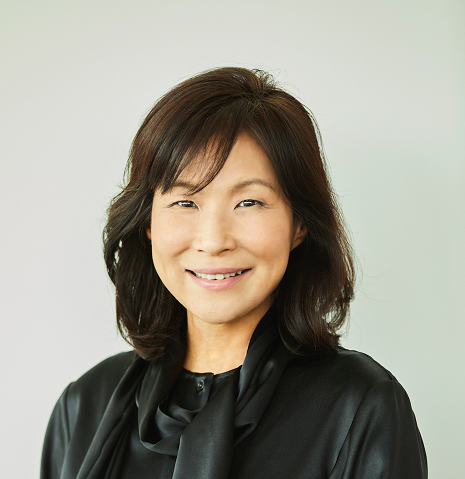Women's Leadership and Empowerment: Challenges from Japan's Ranking as 120th in the World | TMC Talks Vol.6
日本語で読む/Read in Japanese
Watch the full movie here
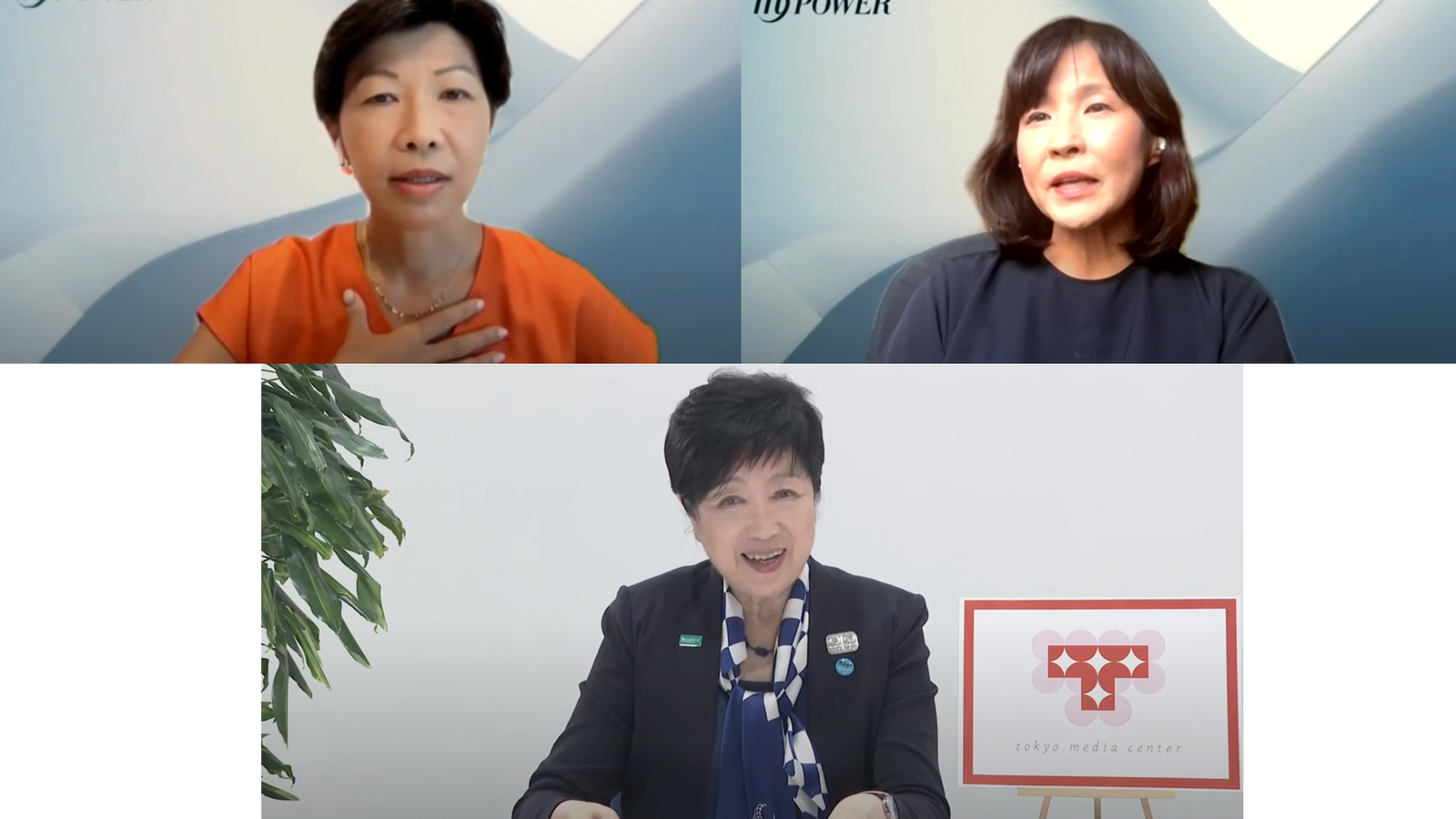
Governor:Hello everyone, I am Koike Yuriko, Governor of Tokyo. In today's TMC Talk, I will host a dialogue under the theme of "Women's Leadership and Empowerment." Now I am pleased to welcome two wonderful guests.
First, let me introduce our guests. Kathy Matsui and Murakami Yumiko are participating online. Thank you for taking time to join us today.
Allow me to start by introducing Ms. Kathy Matsui. After graduating from Harvard University and Johns Hopkins University Graduate School, Ms. Matsui was active at Goldman Sachs for many years. She is also one of the foremost proponents of "womenomics," or the effort to revitalize the economy through the social advancement of women. For nearly 20 years, she has been a research analyst, and has been watching trends in the Japanese economy and the social advancement of Japanese women. She held the position of Vice-Chair at Goldman Sachs Japan until the end of 2020. In May of this year, together with Ms. Murakami, whom I will introduce next, Ms. Matsui set up a venture capital firm MPower Partners Fund L.P. which focuses on ESG investments. Wonderful.
Next, I would like to introduce Ms. Murakami. After completing graduate school of Stanford University and Harvard University, Ms. Murakami was active in the U.S. and European financial industry including Goldman Sachs for around 20 years. She also worked in the United Nations and the OECD. She served as the Director of the OECD's Tokyo Center until May this year.
Thank you for joining us, Matsui-san and Murakami-san. First, can I have some words from Matsui-san?
Ms. Matsui: First of all, thank you very much Governor Koike-san for inviting us to speak with you today. I also just wanted to personally thank you for your tremendous hard work and leadership, not only by leading the Tokyo Olympics and Paralympics, which I think are going extremely well, but also for managing the very tough Corona situation. You have been my role model for many years and I so admire you.
Governor:Thank you very much. Ms. Murakami, can I have some words?
Ms. Murakami:Sure, thank you again from me as well for having us here with you. Governor Koike, we have done quite a few events like this in the past and I have always admired your leadership in promoting diversity, not only for Tokyo but for the entire country and now as you have just mentioned, we just launched this fund, which is the first female-led VC(venture capital) fund and I would like to continue working with you in promoting diversity in this country. Thank you.
Governor:Thank you very much. First of all, let's talk about the situation which Japanese women face. In the "Gender Gap Index" published annually by the World Economic Forum, the famous one, Japan has ranked 120th, followed by Sierra Leone, in 2021 making us the lowest ranked amongst G7 countries. What a shame. We can see large growing gender gaps, especially in the areas of "politics" and "economy."
Please take a look at this report from the Inter-Parliamentary Union. The percentage of Japanese female politicians at the national lower house level is 9.9%, which is much lower than the world average, 25.6%. In the international community, the movement toward gender equality is becoming more active, as it is set as one of the SDGs (Sustainable Development Goals).
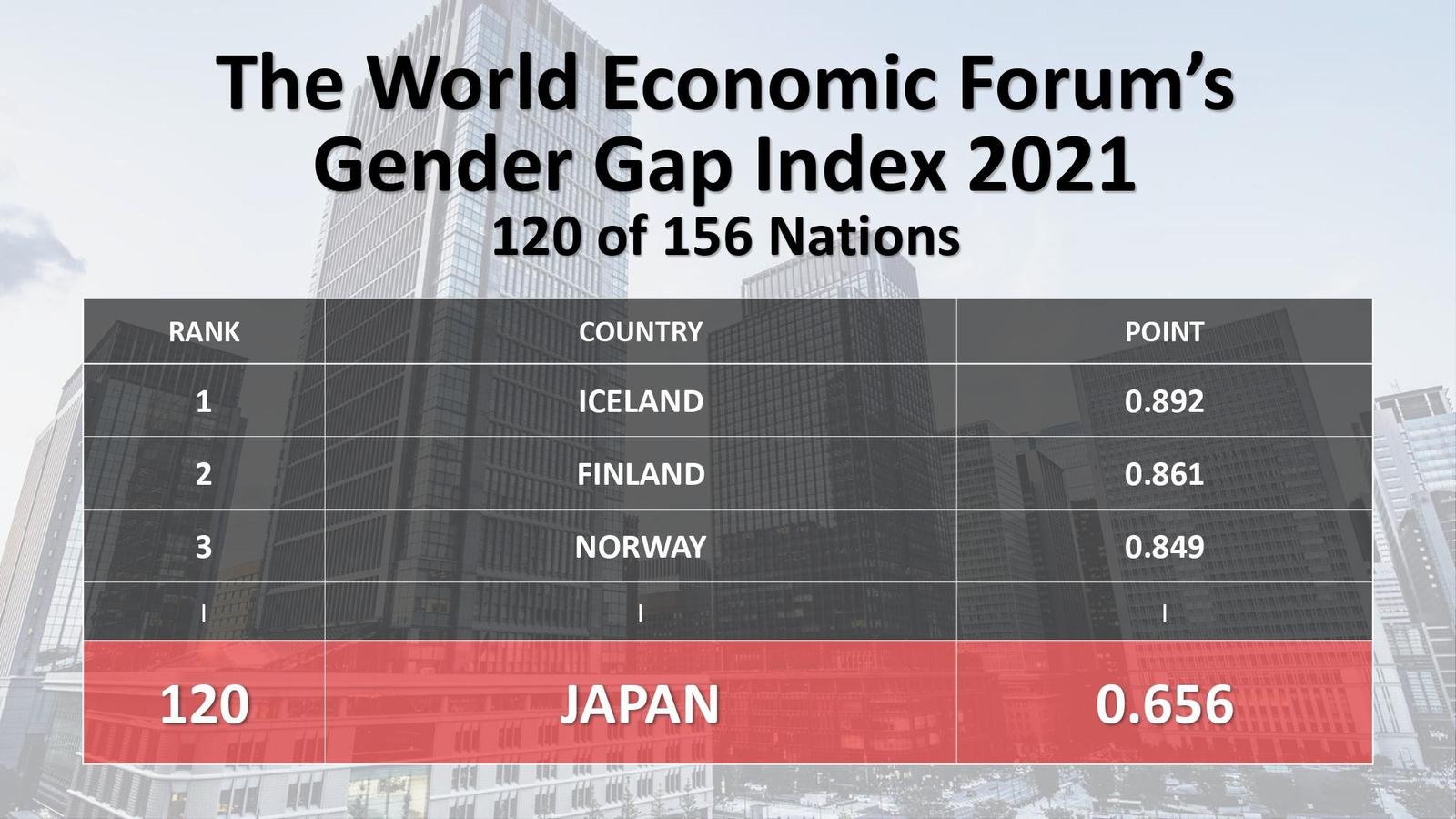
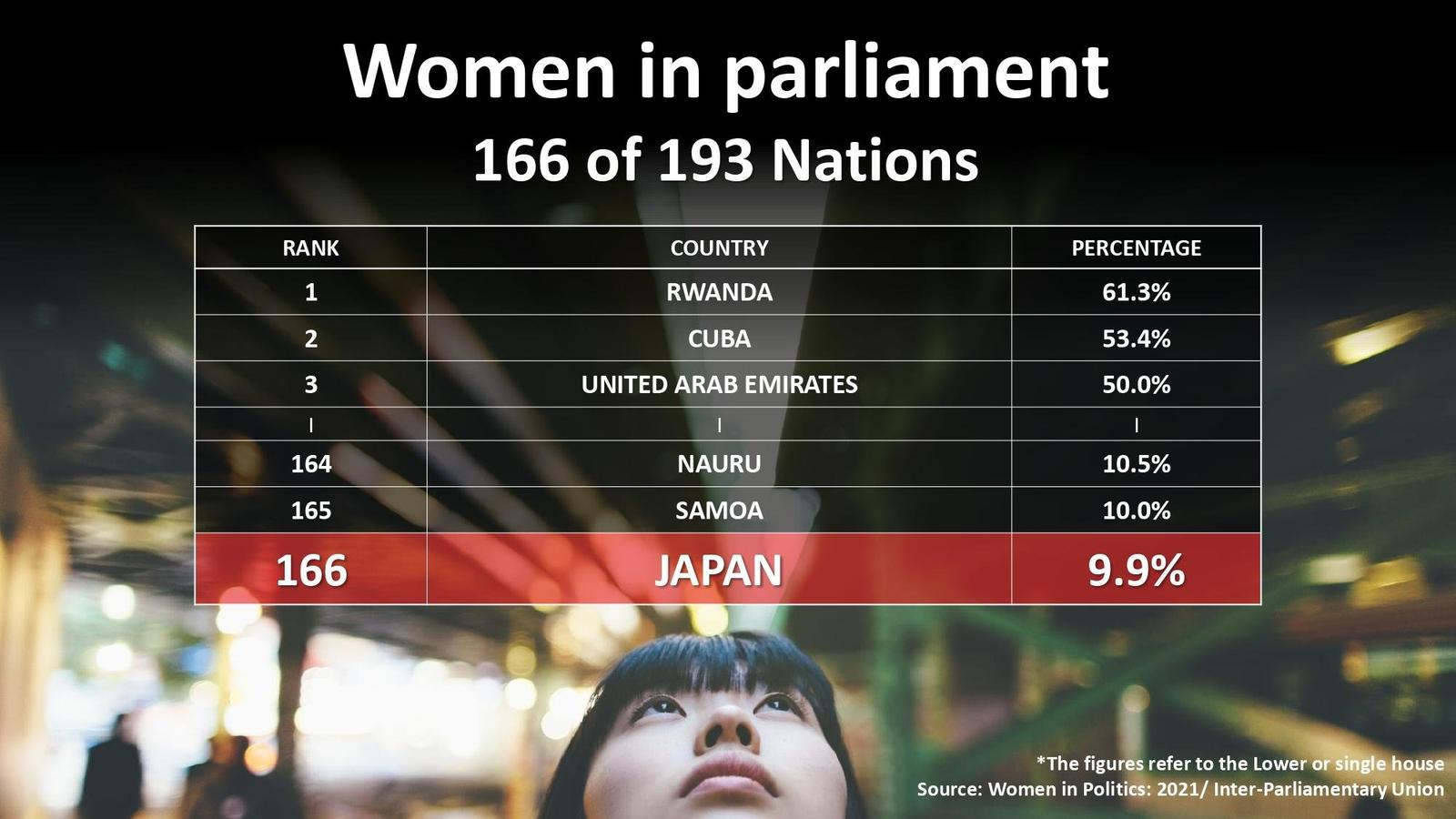
I would like to ask you to tell us your opinions on the reasons why gender equality in Japan is not progressing. Well, we've been talking about this theme for almost 20 years, right Kathy? First, let's hear from Ms. Matsui.
Ms. Matsui:I've done, as you know, over two decades of research in this field, gender diversity or womenomics and there are a number of reasons why Japan's ranking, in the surveys, tends to be quite low.
The number one overarching obstacle is this insufficient understanding that gender diversity can actually boost economic growth and corporate performance. I think, many people still, not just in Japan but globally, don't quite get it. They don't understand that there is a direct correlation between adding diversity or including diverse ways of thinking in management decision-making and outcomes of a company's performance. I think we're in a much better position, frankly thanks to your leadership and other progressive-minded politicians in this country, but we still have a ways to go.
Just some other obstacles, persistence of what I call unconscious biases and gender-role stereotypes. Of course, Japan is not alone, they exist world-wide, but I find, as an American citizen living in Japan for over 30 years, those stereotypes are quite engrained in Japanese society.
Third is inflexible labor contracts and labor market policies. It doesn't apply to every company of course, but for large companies, young women when they enter the company they have to decide whether to pursue the career track or the non-career path and I think it's very hard for a young woman to decide in the first few weeks of her new job, which path to choose. There's little flexibility, still to this day, around those options.
Fourth is inadequate care-giving capacity, whether that's child-care but also, these days, elder care capacity.
Tax disincentives. I know you've also helped to fight the spousal tax deduction issue, which acts as a disincentive for women to work full-time, so a lot of Japanese women are working part-time roles. So, I think these are the most common factors that are raised.
To add one final thought, within companies or within organizations, I find that there is not enough attention or focus paid on managing female careers and, though men also need that attention, women tend to need a bit of extra focus or extra managemental support and encouragement to pursue managerial roles or more senior roles in their organizations. I think none of these obstacles are insurmountable, I think they're all possible to overcome, so we just all have to work together.
Governor:Thank you very much, Kathy. Ms. Murakami, how about your thoughts?
Ms. Murakami:Yes, I agree that these gender statistics are not very encouraging. But you also have to remember that we have done quite a bit of...made a lot of effort in terms of promoting women to work. When you look at the female labor market participation, as you know, Japan has one of the highest levels when it comes to the percentage of women working today versus many other European countries or even compared to the US. So, that is actually a very bright spot among some of these disappointing data points.
I think we have done a decent job on that front in terms of encouraging women to work. The issue here is, even though there are more women working today, compared to ten years ago or twenty years ago, not many of them are in leadership positions. They're not part of the decision-making process and that is the problem for Japan. I think it's just not only men or women, but in general, diversity that includes age diversity, nationality, any sort of different types of people, when they are sitting around the same table, chances are, there are going to be different opinions, different views.
When you have different opinions and different views, chances are, you're going to come up with solutions that are outside the box. So, it makes you more innovative, it makes companies more innovative, it makes country more innovative, that's the most important part of the diversity benefit that I think Japan really needs to understand, society really needs to understand and promote the culture in which people can accept differences. People need to understand how important it is to agree to disagree.
I think that essence or mindset is something we all have to work collectively to enhance, especially with younger people, the next generation, to make sure that they do not develop gender stereotypes or unconscious biases and I do believe that seeing is believing. So, seeing someone like you, Governor Koike, in that very powerful position as the governor of one of the largest cities in the world, a woman, that says a lot. Younger people looking up saying, "oh, there's a woman in that position" makes a big difference.
Governor:Thank you very much. Both of you have pointed out very substantial points and we are looking forward to overcoming those difficulties. It is said that a lack of women in decision-making positions is a key factor holding back gender equality in Japanese society. Well, I am one of the two female governors out of the 47 prefectures in Japan.
Gender equality is not only for women, rather it leads to a more vibrant society in which both women and men can choose their own lives and futures. What are some of the steps we should take to realize such a society? If you know of any good examples from overseas, please let us know.
I would like to start with Murakami Yumiko-san. What are your thoughts?
Ms. Murakami: Sure, there are a number of good examples we can learn from, for example on the education front. Other countries have adopted this policy of gender mainstreaming, by which they look at everything from textbook to teachers in the classroom and make sure that there is really no gender bias.
For example, if you have a textbook that is written for a first grader and the textbook has only male doctors and only female nurses, what do you think the first graders will think? "Oh, when I grow up", if I'm a girl, "I'm going to be a nurse, but not a doctor." If you're a boy, "I'm going to be a doctor, but not a nurse". So, these are very simple examples, but I think it's important to start at a very younger age. Things like that are very simple to implement, but very important.
I do think that this is one example of the textbook, but there are a number of examples like that. We can start from there and maybe Kathy can talk about other examples that we can implement in the business setting.
Governor:Thank you. What about you, Kathy?
Ms. Matsui:Yes. I would say, five proposals that we've done a lot of research on in the past, looking at global best-practice examples might be useful for Japan to consider. Let me start with, for instance, in 2015, the Japanese national government passed the Act on Promotion of Women's Participation and Advancement in the Workplace, which frankly was a game-changer because, prior to that law, there was no disclosure requirement at all in this country. But that forced organizations at the time with 300 or more employees to disclose gender-related statistics, encouraged companies to set gender targets. So that was a good first step, but my suggestion is to go even further. As a research analyst analyzing the Japanese stock market for decades, we need data that is comparable across companies, across industries, and a lot of data that Japanese companies were providing looked good, but not standard. Everybody had their own definition, some companies disclosed a lot of gender data, but others didn't do so much. So, stricter mandates around gender-related disclosures is number one.
Now number two, this is close to your heart governor, is parliamentary gender quotas. One reason why Japan ranks so low is because many countries actually enforce parliamentary gender quotas. There are many ways to do this, there are many opinions about this topic I know in Japan, but if you don't jump-start this process, it could take centuries to really move that needle. That's my personal view.
Third is requiring gender pay-gap disclosure. This is more relevant not just for the private sector in particular, but we do know in global cases. There are many companies where the CEO swears that there is no gender pay gap between our female and male staff, but when we actually look at the data, in most cases they found gender pay gaps. So, requiring disclosure around that.
I talked about tax disincentives and rectifying those.
Lastly, something that Yumiko and I are trying to change, is promoting female entrepreneurship. For example, I know the government has some preferential treatment for minority-owned businesses, like women-owned businesses, but this could be made more robust, more expansive, low-interest rate loans, helping to get customers, and I know you, governor, have taken a lot of leadership in this arena, but we'd like to see this more nation-wide. I think that's a huge opportunity for Japan.
Governor:Thank you very much.
In the previous discussion, it was pointed out that the decision-making process requires diverse and fresh perspectives.
Since I became the first female Governor of Tokyo in 2016, I have promoted women employees positively and actively at the Tokyo Metropolitan Government. Gender equality also requires a change of consciousness on the part of men, as well as changing gender biases such as in the roles of men and women. The Tokyo Metropolitan Government is making efforts to change our organizational culture, such as creating an environment where it is easier for men to take childcare leave. The rate of male employees taking childcare leave has increased from 6.5 percent in 2016 when I took office, to 18.3 percent in 2019.
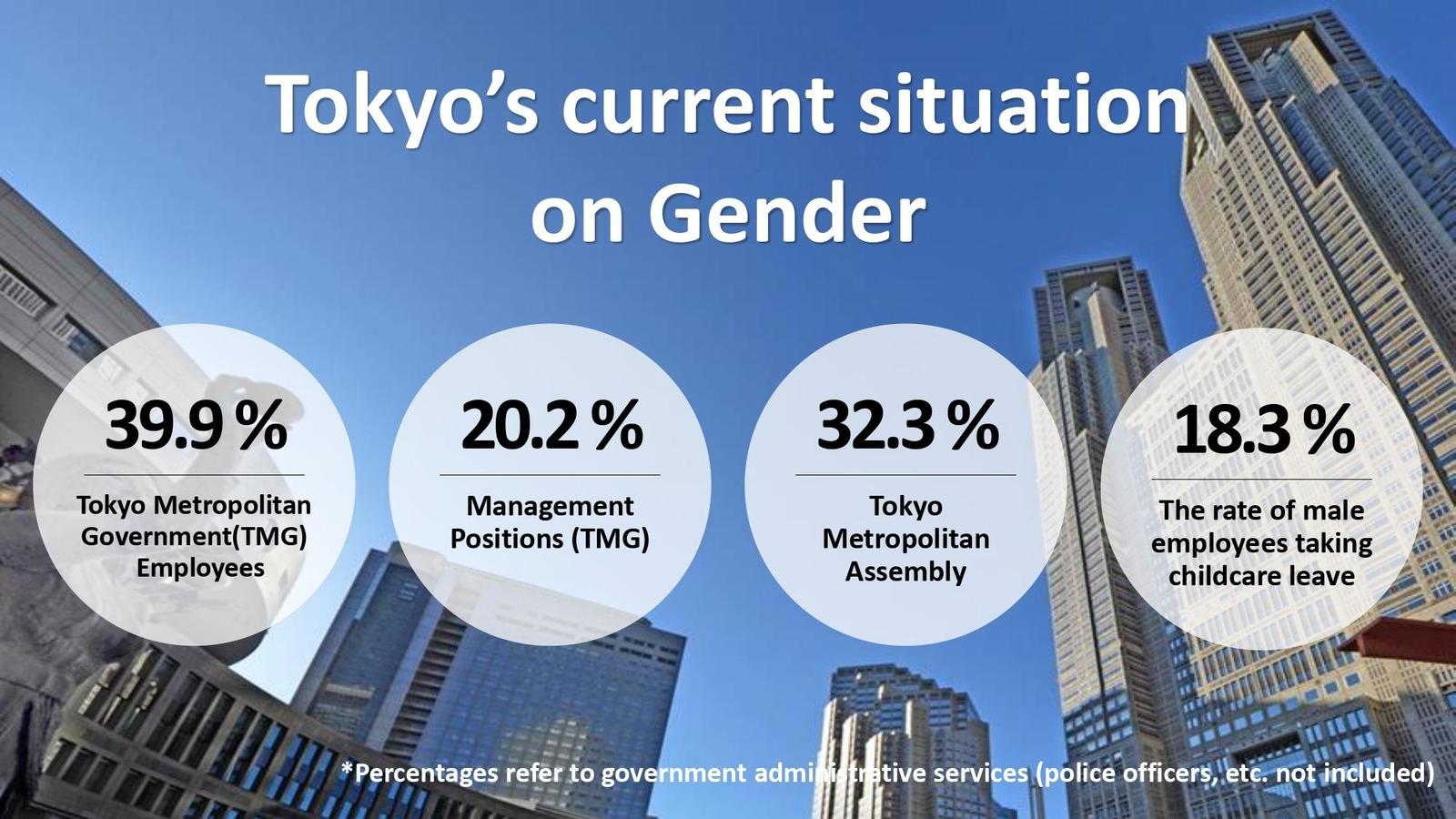
In order for Tokyo to be a city where everyone can fully utilize their own abilities and thrive, it is important for women to be empowered, put their abilities to use and have their voices reflected.
Starting in 2018, the Tokyo Metropolitan Government held the "NEW CONFERENCE" for female leaders. "NEW" stands for "Network to Empower Entrepreneurial Women", NEW. This conference was created with the philosophy of "the future of Tokyo will be driven by female CEOs," your cases I think. We invited prominent female managers as speakers to discuss a wide range of issues that need to be faced for business to grow. Both Kathy and Yumiko-san also participated. I think that building a network of female entrepreneurs and sharing know-how is extremely significant.
In fact, Kathy Matsui-san and Yumiko Murakami-san have recently started, as you have already said, an investment firm together. Please share with us any advice for women who want to start a business or women who are already building their own businesses. I would appreciate it if you have any advice from the perspective of entrepreneurship support. Kathy-san?
Ms. Matsui:Thank you. So, Yumiko and myself, and our third General Partner Miwa Seki, our backgrounds are not that entrepreneurial, we all worked at large organizations and corporations most of our careers, so we found embarking on this entrepreneurial journey, we're learning something new every single day. While it's still early days for us, I would suggest three pieces of advice to share.
Number one, start with a clear vision and mission of what you want to achieve. And also, I think, not just important for women, but particularly for women, make it clear how your business or what you're doing is differentiated from the others. I think that the differentiation factor is significant and, given that we're emphasizing ESG integration in our venture capital investments and we are the first in Japan to do this kind of investing in the venture space, that is our key differentiator.
Second, among all things that you need to create a business, the absolutely number one most important decision is who you're working with, who your partners are, who you're recruiting to the team. It goes without saying that, for small businesses, every single person matters, what they can contribute. And, of course, when a business is going well, good people are okay, but when a business is not going well, that's really what tests the quality of the people. So, recruit wisely and build an organization founded on integrity and trust.
Finally, as you said, the NEW CONFERENCE, the feature of that conference is building a network of supporters. I found that, through my thirty-year career in finance, men are very good and very natural at building a network. I think women, some are good, but most need help. If you don't ask, you shall not receive. This is one of my principles of life. Ask people for help. So many people have been so generous with their time and their knowledge and their expertise to help us. We're just newbies, we're just starting in this arena, but it's really important to help build your business by leaning on others who are experts in legal issues or accounting issues, because you will need their help, and it's a two-way street. Don't get me wrong. We've been very fortunate to be surrounded by really helpful people in our network.
Governor:Thank you very much. How about your ideas, Ms. Murakami?
Ms. Murakami:It's a little bit same as Kathy, but there is a word in Japanese which has two different meanings. "chigau" means "different" and "wrong", which are completely different. I think this is a reflection of Japanese culture. When you're in Japan, you may think that you are wrong to be different. I want to make sure that people, especially women, don't think that way. Being different, in the business sense, in the startup space, is the number one weapon. Be proud that you're different. And you are going to be different because there aren't that many female entrepreneurs in Japan yet. Hopefully that will change. I think that that's the number one thing, be different.
Governor:Okay, Thank you very much. Your advice is very important and inspiring, thank you very much.
The Tokyo Metropolitan Government recognizes that promoting the spread of ESG investment is important when aiming to become a global financial city and we are implementing various initiatives to do so. Actually, your company is taking the lead in the field of ESG investment and I am looking forward at how your business becomes successful in that field.
Our guests have created their own company, the two of you, by focusing on investments in businesses with a special focus on ESG investing. What do you think on this topic, Ms. Murakami?
Ms. Murakami:Often times, when people talk about investing in ESG, people tend to think that it's a social impact fund or CSR, some kind of innovative charity-related activities. But, in reality, ESG should not be considered a cost, it's an enhancer of corporate value. If you look at it that way, if you want to make very good returns out of your investment, of course you have to look at ESG in mainstream companies. That's the way we're looking at it. We think we can actually achieve that, high economic or financial performance as a fund, because we integrate ESG into our fund.
Governor:Thank you very much. Now, Kathy, I would like to hear about your views based on the new company you launched with Ms. Murakami, about ESG.
Ms. Matsui:If we look at the global backdrop to ESG or sustainable investing, it has simply exploded. Currently, ESG assets are approximately 35 trillion USD and are expected to grow by another 15 to 20 trillion USD, in other words the size of the US' S&P 500 today. Growing another US stock market is expected growth in this category of investing. As Yumiko pointed out, it's not just because people are realizing that it enhances performance, but also if you think about Corona or COVID, it's become very clear to everybody in the world, not just looking at financial metrics, but non-financial metrics, like "what kind of impact is your company having on the community?", "how are you managing the environmental footprint of your supply-chain?", these are questions that are now being raised by the world's largest investors and companies can no longer escape or ignore those difficult questions. You have to answer them. I think the world has really shifted. This is not just a trendy topic of ESG and tomorrow will be another theme. We strongly believe, and that's why we started this fund, that this is here to stay. It's interesting that Japan originated this concept of "sampou-yoshi (triple win, three way satisfaction)", a more stakeholder-based capitalism as opposed to pure, Anglo-Saxon shareholder capitalism, but it has a bit of this "sampou-yoshi" flavor to ESG. So, hopefully, Japan will become a leader, and Tokyo will become a leader in ESG investing in the world.
Governor:Thank you very much. As ESG investment increasingly attracts attention, perspectives like this from the corporate side will also become important.
Now, during the closing ceremony on August 8, I passed the Olympic flag over to Mayor Hidalgo of Paris, the host city for 2024. Did you know that this was the first time in history that the handover has been from a woman to another woman? It symbolized Tokyo 2020's concept of "Unity in Diversity."
We must take the opportunity provided by the Games to lead the way towards a better future where gender equality is realized and human rights have become firmly rooted in society. I think that this will be the true legacy of the Tokyo 2020 Games.
Today's talk was very enlightening. Thank you very much, Kathy-san and Yumiko-san, for joining us.





